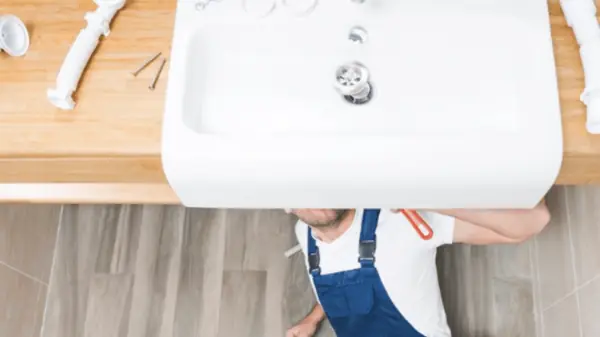Whether you’re facing persistent plumbing problems or simply aiming to enhance your home’s water system efficiency, understanding the nuts and bolts of plumbing upgrades can be incredibly beneficial. This guide is crafted for homeowners looking to navigate the complexities of replacing old pipes and installing modern plumbing solutions.
From the signs that indicate a need for a complete overhaul to the advantages of upgrading your plumbing infrastructure, we’ll cover all the key aspects to help you make informed decisions.
Stay tuned as we explore how these essential upgrades can improve water quality, increase property value, and save you from future plumbing woes.
How do I know if my home needs a complete repipe?
Several signs indicate that your home may need a complete repipe:
- Frequent leaks: If you’re experiencing leaks in multiple areas of your home or if leaks occur repeatedly despite repairs, it could be a sign of deteriorating pipes that need replacement.
- Low water pressure: Persistent low water pressure throughout your home, even after cleaning fixtures and checking for blockages, might indicate corroded or clogged pipes that need upgrading.
- Discolored water: Rusty or discolored water from your faucets could signal corrosion inside your pipes, affecting water quality and indicating the need for repiping.
- Old pipes: If your home has older plumbing pipes made of galvanized steel or polybutylene, they have reached their lifespan and are prone to leaks or corrosion, necessitating a complete repipe for safety and efficiency.
- Foul odors: Unpleasant odors emanating from your drains could indicate sewage leaks or buildup within your pipes, indicating the need for inspection and potential replacement.
- Visible corrosion: If you notice signs of corrosion, such as flaking, rust spots, or disintegration, on your pipes, they need replacing before more extensive damage occurs.
Suppose you observe any of these signs in your home’s plumbing system. In that case, it’s advisable to consult a professional plumber to assess the situation and determine if a complete repipe is necessary to ensure your plumbing infrastructure’s long-term integrity and performance.
What are the benefits of upgrading my home’s plumbing system?
Upgrading your home’s plumbing system offers several significant benefits:
- Improved efficiency: Modern plumbing systems are designed to be more efficient, reducing water waste and lowering utility bills. Upgrading fixtures, such as faucets and toilets, to water-saving models can contribute to water conservation.
- Enhanced reliability: New pipes and fixtures are less prone to leaks, corrosion, and other issues commonly associated with aging plumbing systems. By upgrading, you can enjoy greater peace of mind, knowing that your plumbing is less likely to experience unexpected failures.
- Better water quality: Upgrading your plumbing system can improve the water quality in your home. New pipes and filtration systems can help remove impurities and contaminants, providing cleaner, healthier water for drinking, bathing, and cooking.
- Increased property value: Upgrading your plumbing system can increase the value of your home. Potential buyers are often willing to pay more for homes with updated plumbing systems, knowing they won’t have to worry about costly repairs or replacements shortly.
- Enhanced safety: Old or deteriorating plumbing systems can pose safety risks, such as leaks or bursts that could lead to water damage or mold growth. Upgrading your plumbing system ensures your home remains safe and secure for you and your family.
- Customization options: When upgrading your plumbing system, you can customize it to suit your needs and lifestyle better. Whether installing a new shower system, adding a water softener, or incorporating innovative remote monitoring and control technology, upgrading allows you to tailor your plumbing to fit your preferences.
Upgrading your home’s plumbing system offers numerous benefits that can improve your quality of life, save you money, and increase the value of your property.
What is involved in a complete repiping process?
A complete repiping process involves several steps to replace the existing plumbing system throughout your home:
- Initial assessment: A professional plumber will thoroughly inspect your home’s plumbing system to assess its condition and identify any issues that need to be addressed. This includes examining the pipes, fixtures, and connections for signs of corrosion, leaks, or other damage.
- Planning and preparation: Based on the assessment, the plumber will develop a repiping plan that outlines the scope of work, materials needed, and timeline for completion. This plan may involve coordinating with other tradespeople, obtaining necessary permits, and scheduling the project to minimize disruption to your daily life.
- Pipe replacement: The next step is to replace the old pipes with new ones. Depending on the extent of the repiping project, this may involve accessing pipes behind walls, under floors, or in ceilings. The plumber will carefully remove the old pipes and install the new ones according to the repiping plan.
- Fixture installation: Once the new pipes are in place, the plumber will install new fixtures such as faucets, toilets, showers, and sinks. This may also include upgrading other plumbing components such as valves, shut-off switches, and water heaters as needed.
- Testing and inspection: After the repiping, the plumber will test the new plumbing system to ensure everything functions correctly. This includes checking for leaks, verifying water pressure, and confirming that all fixtures work as they should. Depending on local regulations, an inspection may be required to ensure the work meets building codes and standards.
- Cleanup and restoration: Once the plumbing system has been inspected and approved, the plumber will clean up and restore any areas disturbed during repiping. This may involve patching walls, repairing flooring, and restoring landscaping as needed to leave your home in its pre-project condition.
A complete repiping process is a complex undertaking that requires careful planning, skilled labor, and attention to detail to ensure a successful outcome. Hiring a qualified plumber with experience in repiping projects is essential to ensure the job is done safely and efficiently.
How much does it typically cost to upgrade home plumbing?
The cost of upgrading home plumbing can vary widely depending on several factors, including the size and layout of your home, the extent of the upgrades needed, the materials used, and labor costs in your area. However, here are some general estimates for standard plumbing upgrades:
- Fixture upgrades: Installing new faucets, toilets, showers, and sinks can range from a few hundred to a few thousand dollars per fixture, depending on the quality and complexity of the installation.
- Pipe replacement: Replacing old or damaged pipes with new ones can cost anywhere from $1,500 to $15,000 or more, depending on the size of your home, the type of pipes being replaced, and the accessibility of the plumbing system.
- Water heater replacement: Installing a new water heater can cost between $800 and $2,500, depending on the type (tankless, traditional tank, etc.) and the size and complexity of the installation.
- Whole-house repiping: A complete repiping project, which involves replacing all the pipes in your home, can cost anywhere from $5,000 to $20,000 or more, depending on the size of your home, the type of pipes being installed, and the project’s complexity.
- Additional upgrades: Other plumbing upgrades, such as installing a water softener, adding a sump pump, or upgrading to a smart home plumbing system, can add additional costs ranging from a few hundred to several thousand dollars each.
It’s important to note that these are just general estimates, and the actual cost of upgrading your home plumbing will depend on your specific circumstances. It’s a good idea to consult a qualified plumber for a personalized estimate based on your home’s needs and budget. High-quality materials and competent installation might also help ensure that your plumbing upgrades provide long-lasting benefits and minimize the need for future repairs.
Revitalize Your Home: Upgrade Plumbing for Efficiency
Say goodbye to leaks, low water pressure, and outdated systems. Our expert team specializes in complete repipes and upgrades, transforming your plumbing into a reliable, high-performance system. With meticulous planning and skilled craftsmanship, we ensure every aspect of your home’s plumbing is optimized for efficiency and durability.
From modernizing fixtures to replacing worn-out pipes, we personalize solutions to your demands and budget. Trust Hi-Desert Plumbing to deliver top-quality artistry and unparalleled service, enhancing the comfort and value of your home for years to come. Contact us now!

